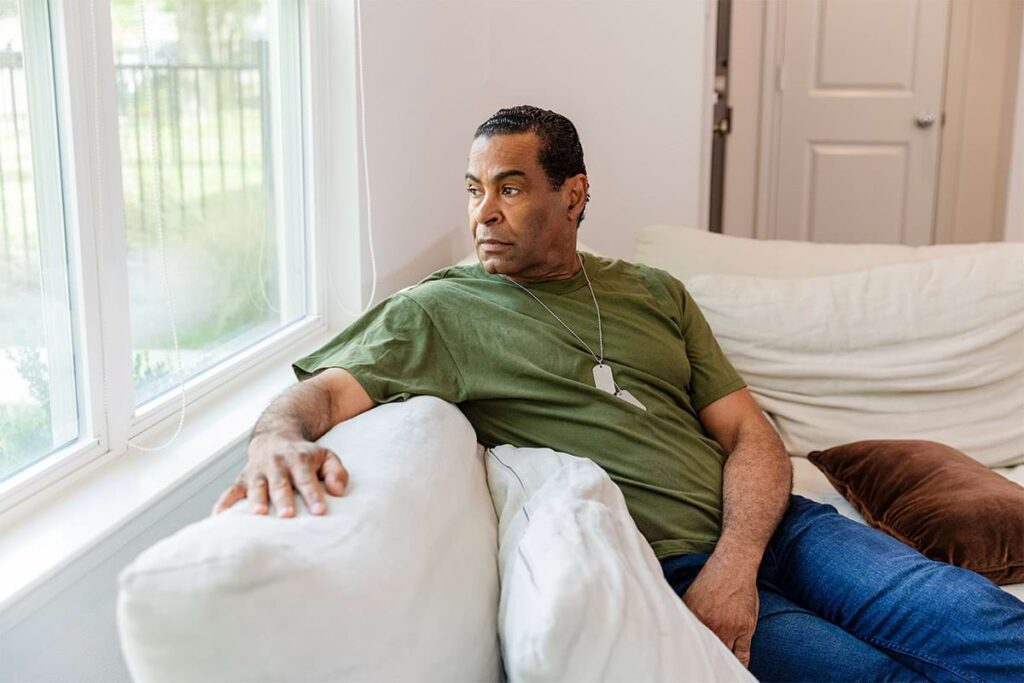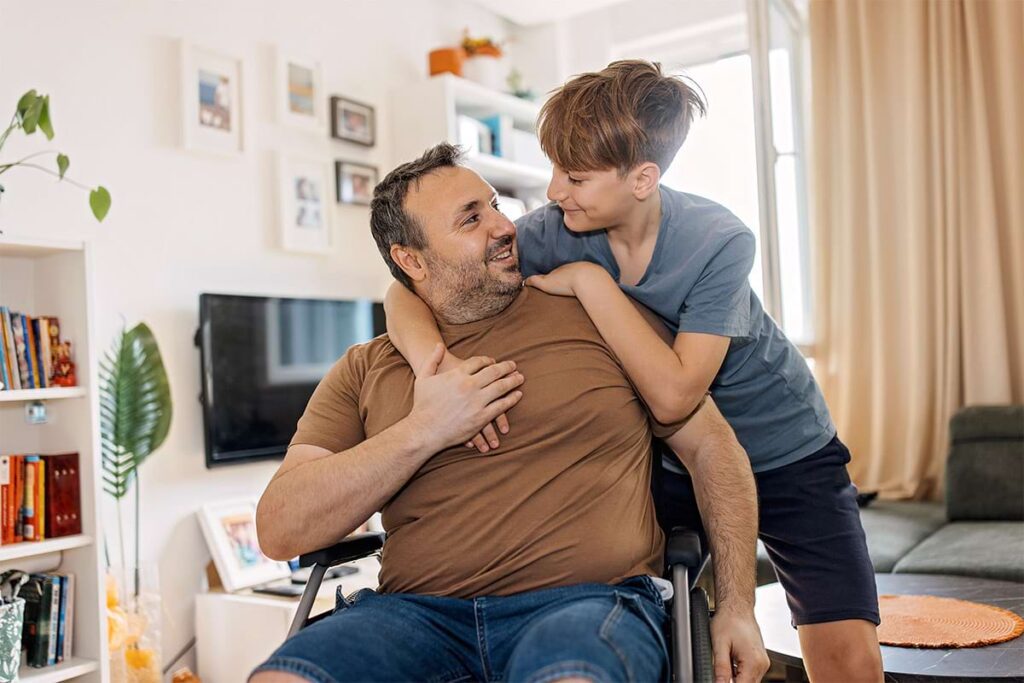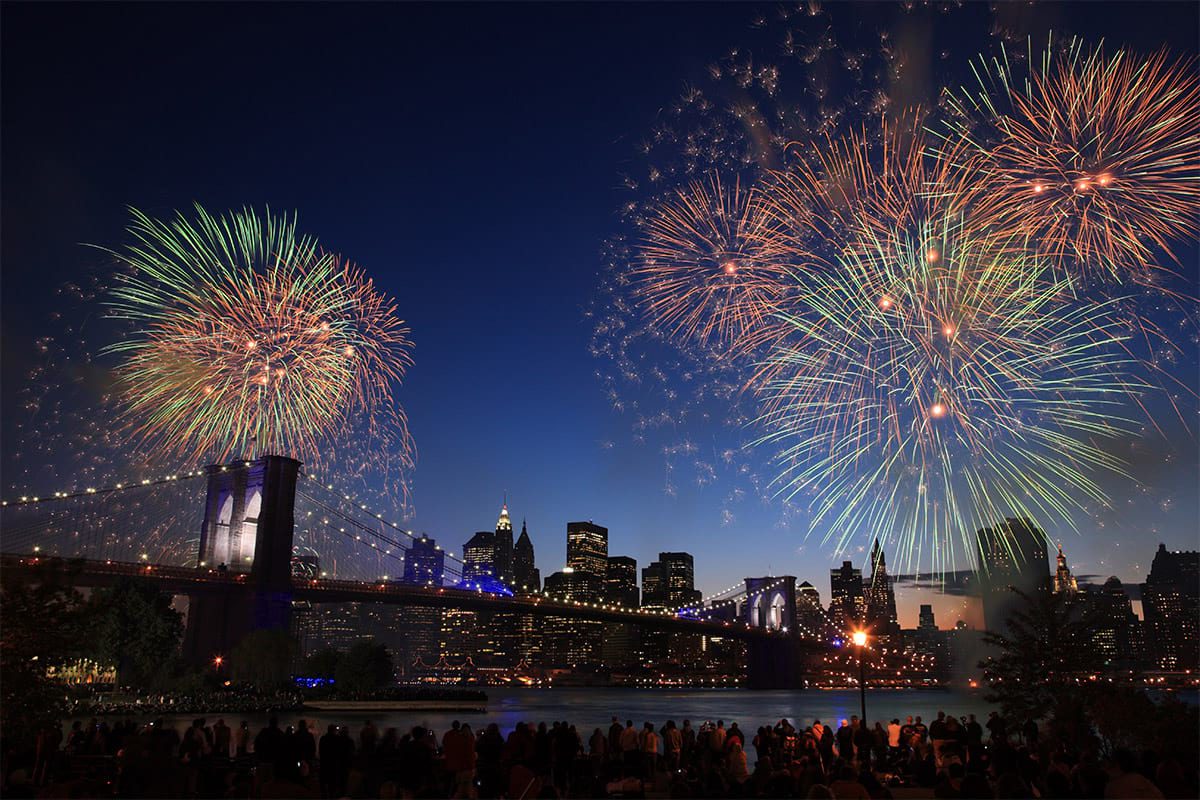Fireworks are a traditional part of American celebrations, including July 4th, concerts, and sporting events. These dazzling displays light up the sky and unite people in joyous gatherings.
But for America’s veterans, fireworks can be a traumatic experience. The loud noise, explosions, crowds, and even the smell of fireworks can evoke memories of combat and trigger post-traumatic stress disorder (PTSD) symptoms, including anxiety, stress, and nightmares.
Understanding the link between fireworks and PTSD is crucial to helping veterans participate in and enjoy celebrations with fireworks.
In this blog, we explore PTSD and its triggers, its impact on veterans, coping strategies, and how families and friends can help someone with PTSD during fireworks displays.
Table of Contents
Understanding PTSD and its Triggers

PTSD is a mental health problem experienced by people after a life-threatening or traumatic event. For veterans who have served in the military, these events can include deployment in a war zone, exposure to the horrors of combat, training accidents, and other experiences.
PTSD is a normal stress reaction to these types of events. According to the National Center for PTSD, seven out of every 100 veterans will have PTSD.
PTSD symptoms are both emotional and physical. Veterans may relive an event through nightmares and flashbacks. Other symptoms include jitteriness, difficulty sleeping, being easily startled by noise, or unhealthy behaviors such as excessive drinking, drug abuse, smoking, or aggression.
Specific triggers and cues, such as fireworks, can serve as trauma reminders. Veterans with PTSD may avoid activities that remind them of an event, including July 4th celebrations, or they may experience negative thoughts before such an event.
Writing in the Federal Practitioner, Cynthia Geppert, who began her psychiatric residence at the U.S. Department of Veterans Affairs (VA), explained the visceral reaction many veterans with PTSD have to fireworks. Regarding July 4th: “The instinct of many veterans is to avoid the holiday altogether: Many patients I knew sought refuge in remote mountain campsites often to find that even there they were not safe from revelers.”
The Impact of Fireworks on Veterans with PTSD
Combat veterans are adept at identifying potential threats in their environment, so the sensory experiences associated with fireworks can provoke a sense of danger, triggering emotional or physical responses.
For example, fireworks events are typically characterized by loud noises, bright lights, and smoky air, often accompanied by loud music and large crowds. For veterans with PTSD, these sights, sounds, and smells can trigger memories of combat exposure, gunfire, and explosions, leading to the resurgence of trauma-related emotions and physical symptoms.
Recognizing Symptoms of PTSD Triggered by Fireworks
There are four types of PTSD symptoms that veterans triggered by fireworks may experience. These include:
- Re-experiencing symptoms: Memories of an event or reliving an event through nightmares, flashbacks, or feeling that the event is happening again can happen anytime and feel very real and scary.
- Avoidance: A common symptom is to avoid any situation or activity that may remind a veteran of a traumatic event. For example, a veteran may avoid July 4th fireworks displays or even watching displays on television. A veteran with PTSD may also use alcohol or drugs to avoid thoughts or memories triggered by fireworks.
- Negative thoughts: PTSD can lead to new negative thoughts following a traumatic event. Veterans may feel numb, have difficulty enjoying gatherings or large crowds, and feel threatened or in danger.
- Hyperarousal: PTSD hyperarousal is a medical condition in which an individual may become highly alert after being reminded of a traumatic event. For instance, fireworks might trigger memories of combat, causing the body to react with increased anxiety, hypervigilance, a heightened startle reaction, and more.
A veteran must exhibit all four symptoms to be diagnosed with PTSD.
Physical Reactions
Physical symptoms of PTSD can include:
- Racing heart
- Sweating
- Shaking
- Headache
- Physical signs of stress
- Aggressive behavior
- Risky behavior
- Struggling to fall and stay asleep
Emotional Reactions
Emotional reactions to PTSD can include:
- Anxiety
- Fear
- Flashbacks
- Avoiding thoughts or feelings related to the traumatic event
- Difficulty concentrating
- Irritability
- Negative thoughts and emotions
- Guilt, shame, or anger
- Loss of interest in activities
- Social isolation
Strategies for Veterans to Cope with Fireworks

Veterans can take steps to manage firework-related PTSD. The key is to learn how to prepare for and respond to potential triggers rather than reacting to them. Support from family and friends can also reduce PTSD symptoms and help veterans understand that, although fireworks may remind them of a past traumatic event, they are not a threat in the context of celebrations like Independence Day.
Preparation and Planning
Instead of avoiding fireworks events, veterans with PTSD can prepare for them by planning ahead. It’s helpful to gather information about the event beforehand, such as the start time of the fireworks and the availability of a safe place nearby. Noise-canceling headphones can also help reduce the impact of loud sounds, such as explosions.
Other mitigation actions include scheduling enjoyable and distracting activities around the event and sharing PTSD and fireworks concerns with others.
Grounding Techniques
In the event of unexpected fireworks or sudden PTSD symptoms, veterans can use grounding techniques to manage their PTSD. Engaging in deep breathing and mindfulness exercises can help reduce anxiety levels during these events and enable veterans to stay grounded in the present moment without constantly being on high alert for potential threats.
Seeking Support
Sharing concerns with friends and family can help veterans plan and manage firework-related PTSD. There are also several resources available from the VA that can help, including the PTSD Mobile Coach. The app teaches veterans how to deal with trauma and triggers. It can be referred to when facing stress-related events, like fireworks. It also provides direct links to support and help.
How Friends and Families Can Help

Veterans with PTSD must have the support of their families and friends. When they encounter triggering events, loved ones can provide words of encouragement, reassure them that they are safe in their current environment (whether it’s a party, concert, etc.), and engage in calming activities such as shared breathing techniques and mindfulness.
Supporting Veterans During Fireworks Celebrations
Here are some tips to help families and friends support veterans during fireworks celebrations:
- Understand potential triggers for veterans during fireworks displays. It’s important to understand that loud noises and bright flashes can evoke traumatic memories for veterans who have experienced combat.
- Communicate with the veteran in advance to discuss their comfort level with fireworks and make a plan together. Families or friends can offer to attend fireworks displays with them or help them find alternative ways to celebrate if they prefer to avoid fireworks.
- Create a safe space for the veteran during fireworks events. Options such as using noise-canceling headphones, finding a quieter location away from the fireworks, or staying indoors during the celebration can help veterans manage fireworks PTSD.
- Be understanding and compassionate. When listening to a veteran’s concerns, it’s important to provide reassurance and avoid minimizing their feelings. Offering support without judgment can make a significant difference in their well-being.
- Encourage open dialogue and check in with the veteran. It’s important to let veterans know that someone is there for them and that their well-being matters. Demonstrating empathy and understanding can make a big difference in supporting veterans during fireworks celebrations.
Communicating Effectively
When talking to veterans about their feelings and comfort levels regarding fireworks, it’s important to approach the conversation with sensitivity and empathy. This will help create a safe and supportive environment for veterans to share their concerns and preferences. Asking open-ended questions, actively listening to their responses, and showing understanding and respect for their experiences are all helpful practices.
Creating a Supportive Environment
It’s important for individuals or groups who are hosting a fireworks event to offer support to veterans.
Local VA medical centers are a useful resource. They often issue announcements with useful tips that educate citizens on the PTSD-inducing impact of fireworks. They also offer resources for veterans to help them navigate these traumatic events.
Hosting PTSD-Friendly Events
Below are some ways to create a calm and safe environment during fireworks events, large or small.
- Provide designated quiet areas: Quiet zones away from fireworks should be provided for individuals who may be triggered by loud noises, sights, and smells.
- Offer ear protection: Earplugs or noise-canceling headphones can reduce sensitivity to noise.
- Communicate in advance: To help attendees prepare accordingly, event planners should announce firework schedules and potential noise levels in advance.
- Provide support personnel: For large, organized events, trained staff and volunteers can assist individuals who may need support or assistance.
- Consider alternative displays: Sparklers, silent fireworks, or laser light shows are a safe and considerate alternative to traditional fireworks.
Alternatives to Fireworks
Using quieter alternatives like laser light shows or silent fireworks can mitigate triggers and provide a more inclusive environment for veterans with PTSD. Drone displays, lantern parades, confetti cannons, and LED light installations can also create visually compelling alternatives to fireworks.
Other options include community gatherings centered around a fire pit or bonfire.
A firework-less July 4th is also increasingly viewed as a greener, safer alternative to fireworks.
Notifying Attendees
Event organizers should ensure that all attendees are informed in advance about the presence and timing of any fireworks display. This will allow veterans and anyone else who may be sensitive to loud noises to make necessary preparations.
Resources and Further Support
There are many resources available for veterans to help prepare for potentially triggering events like firework displays, manage symptoms of PTSD, and access mental health treatment. These include:
- National Center for PTSD: Operated by the VA, the center provides tools and resources for veterans and their families and friends, including self-help and coping mechanisms and treatment options. The PTSD Mobile Coach is also available from the center.
- Veterans Crisis Line: This line is available to veterans and their loved ones, regardless of whether they are enrolled in VA benefits or healthcare. It offers 24/7 phone, chat, or text support from a caring, qualified professional and is free and confidential.
- Local VA Locations: VA health centers are located across the country and provide vital access to PTSD, mental health care, and other VA health services.
- Wounded Warrior Project (WWP): WWP provides access to veteran PTSD treatment support resources, including finding the right care, helping a loved one, and treatment options (such as workshops, counseling, and clinical mental health care).
FAQs
Do fireworks affect PTSD?
The sound, sight, and even smell of fireworks can trigger PTSD in veterans who were exposed to traumatic events during combat, including gun violence, explosions, and training accidents. Symptoms of fireworks PTSD can be physical and emotional and include nightmares, flashbacks, anxiety, avoidance behavior, aggression, racing heartbeat, and more.
How to help someone with PTSD during fireworks?
Here are some tips to help support veterans during fireworks celebrations:
• Understand potential triggers for veterans and be aware of how loud noises and bright flashes can evoke traumatic memories.
• Communicate with veterans in advance to discuss their comfort level with fireworks and make a plan together.
• Create a safe space for veterans during fireworks events by using noise-canceling headphones or finding quieter locations.
• Be understanding and compassionate and encourage open dialogue with the veterans to show your support.
How do you calm down a triggered PTSD?
Everyone is different, but practicing coping skills such as deep breathing exercises, mindfulness, and grounding techniques can help calm down a triggered PTSD episode. Distractions and meaningful activities can also help encourage positive thoughts. Sharing feelings with a friend, family member, or counselor can also help reduce stress and encourage a calmer state.
Conclusion: PTSD and Fireworks
America’s birthday is important to every citizen. However, for many, these celebrations can give rise to debilitating trauma and PTSD. Through awareness and supportive actions, veterans, their families and friends, and community event planners can ensure that our nation’s warriors can manage and mitigate triggers during fireworks events and overcome the distress of PTSD and fireworks.
At Acuity, we offer a range of mental health case management and behavioral health services to help veterans with PTSD receive the right diagnosis, care, and treatment. Our services include mental health screening, advocacy, education, non-medical counseling, treatment plans, fit-for-work and return-to-work evaluations, assistance with workers’ compensation, and more. We follow all the necessary regulatory standards, including OSHA and HIPAA, to ensure that our services are safe and effective.
Learn more about our comprehensive care services or contact us today.
